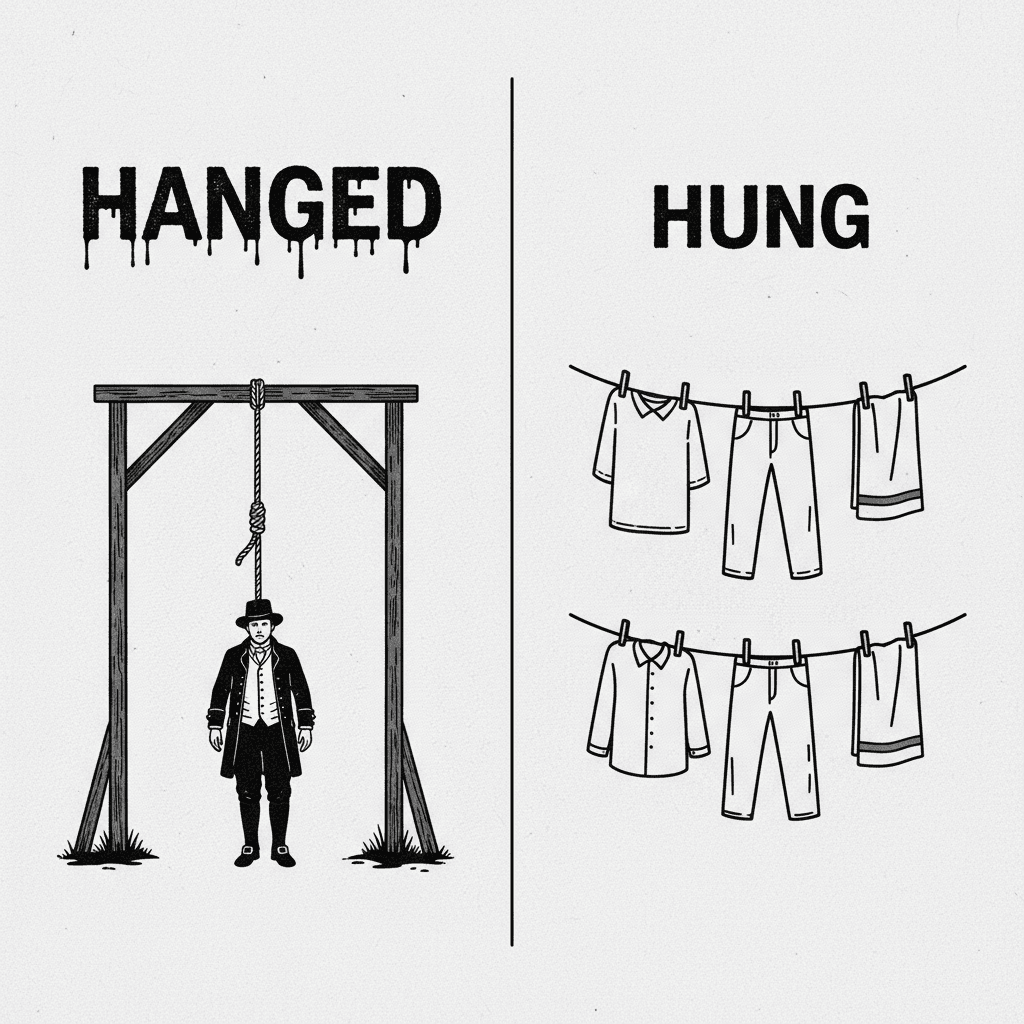Hanged vs. Hung: What’s the Difference?
 The words hanged and hung both come from the verb hang, but they are not interchangeable.
The words hanged and hung both come from the verb hang, but they are not interchangeable.
Their meanings depend on what or who is being hung.
Here’s the quick rule:
- Hanged → used when referring to execution by hanging ⚖️
- Hung → used for everything else (objects, pictures, coats, etc.) 🖼️
1. Hanged: Used for Executions
Meaning
“Hanged” is used only when talking about killing or execution by suspending a person by the neck with a rope.
It is the past tense and past participle form of hang in this specific meaning.
Examples (10 total)
- The criminal was hanged for his crimes.
- In the 18th century, thieves were often hanged.
- The judge ordered that the prisoner be hanged.
- They were hanged publicly as punishment.
- The traitor was hanged at dawn.
- He would have been hanged if caught.
- The spy was hanged for treason.
- The man was hanged by the neck until dead.
- She feared he might be hanged unjustly.
- In history books, many revolutionaries were hanged.
🧠 Tip:
If it involves a person and death, the correct word is hanged.
“The prisoner was hanged.” ✅
“The prisoner was hung.” ❌ (wrong in this context)
2. Hung: Used for Everything Else
Meaning
“Hung” is used in all other situations — when something is suspended, attached, or placed on a hook, wall, or line.
It’s also used in idioms like hung out, hung up, or hung around.
Examples (10 total)
- She hung the picture on the wall.
- The clothes were hung outside to dry.
- He hung his coat on the hook.
- The flag was hung at half-mast.
- We hung decorations for the party.
- They hung their backpacks by the door.
- He hung his head in shame.
- The lights were beautifully hung across the room.
- She hung around after class to talk to her teacher.
- He hung up the phone angrily.
🧠 Tip:
If it’s about an object (not a person), always use hung.
“The picture was hung on the wall.” ✅
“The picture was hanged on the wall.” ❌
3. Quick Comparison Table
| Context | Correct Word | Example |
|---|---|---|
| Execution (person) | hanged | The prisoner was hanged. |
| Objects / things | hung | The coat was hung on the hook. |
| Picture or art | hung | The painting was hung in the gallery. |
| Decorations | hung | We hung lights for the festival. |
| Historical executions | hanged | Pirates were often hanged in public. |
4. How to Remember
👉 Hanged = death / execution
👉 Hung = everything else
💡 Memory Trick:
“A person is hanged, a picture is hung.”
5. Common Mistakes
❌ The thief was hung for his crimes.
✅ The thief was hanged for his crimes.
❌ We hanged the photos in the hall.
✅ We hung the photos in the hall.
❌ The clothes were hanged to dry.
✅ The clothes were hung to dry.
6. Why It’s Confusing
In Old English, hanged was used for both meanings.
Over time, hung replaced it in general use — except for executions, where hanged remained traditional in law and formal writing.
Modern grammar tools like Humanizey automatically choose hung or hanged based on your sentence’s meaning — ensuring your writing sounds accurate and humanlike.
FAQs
1. Is “hanged” still used today?
Yes, but only in legal or historical contexts (e.g., “He was hanged in 1850.”).
2. Can I say “He was hung”?
Not if you’re referring to execution. Use hanged.
3. Is “hung” ever wrong?
Only when describing execution — otherwise, it’s correct.
4. Do both take “have”?
Yes: has hanged (for executions), has hung (for other uses).
Practice: Choose the Correct Word (“Hanged” or “Hung”)
(Answers are listed at the end.)
- The criminal was ___ by the authorities.
- She ___ the picture above the fireplace.
- The clothes were ___ outside to dry.
- The traitor was ___ for treason.
- He ___ his head after making the mistake.
- They ___ the flag at half-mast.
- The pirate was ___ at dawn.
- We ___ the Christmas lights yesterday.
- The old photo was ___ in the hallway.
- The prisoner was found guilty and ___.
Answers
- hanged
- hung
- hung
- hanged
- hung
- hung
- hanged
- hung
- hung
- hanged
